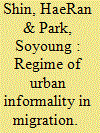|
|
|
Sort Order |
|
|
|
Items / Page
|
|
|
|
|
|
|
| Srl | Item |
| 1 |
ID:
105892


|
|
|
|
|
| Publication |
2011.
|
| Summary/Abstract |
This article seeks to explain how and why groups and networks of undocumented migrants mobilizing in Berlin, Montréal, and Paris since the beginning of the 2000s construct different types of claims. The authors explore the relationship between undocumented migrants and state authorities at the local level through the concept of the citizenship regime and its specific application to undocumented migrants (which they describe as the "borderline citizenship regime"). Despite their common formal exclusion from citizenship, nonstatus migrants experience different degrees and forms of exclusion in their daily lives, in terms of access to certain rights and services, recognition, and belonging within the state (whether through formally or nonformally recognized means). As a result, they have an opportunity to create different, specific forms of leeway in the society in which they live. The concurrence of these different degrees of exclusion and different forms of leeway defines specific conditions of mobilization. The authors demonstrate how the content of their claims is influenced by these conditions of mobilization.
|
|
|
|
|
|
|
|
|
|
|
|
|
|
|
|
| 2 |
ID:
154852


|
|
|
|
|
| Summary/Abstract |
This study looks at how a regime of urban informality has taken shape in a migrant receiving community in Seoul, South Korea. It investigates how actors from the public sector and the private sector came to help undocumented Chosŏnjok migrants stay in the Kuro/Taerim area of Seoul regardless of their legal status. We view such practices as a response to local changes provoked by shifts in the geopolitical environment and fluctuating national policies. Based on longitudinal fieldwork, including in-depth interviews, participant observation, and archival research the findings of this study are as follows. First, public-sector actors, including the Korea immigration service, local authorities, and local police, have shifted their roles from controlling to accommodating, being motivated by competition with other departments, promotion, and personal attachment. Second, the private sector has expanded its role, building on relations with Chosŏnjok as easygoing customers and service providers. This study contributes to the understanding of regimes of informal settlements and their spatial contexts.
|
|
|
|
|
|
|
|
|
|
|
|
|
|
|
|
| 3 |
ID:
184258


|
|
|
|
|
| Summary/Abstract |
We seek to answer a deceptively simple question: why do private citizens in liberal democracies offer hospitality to undocumented migrants? Through qualitative interviews with French citizens, we propose three reasons. The first is widely recognized in the scholarly literature: hospitality is offered out of a care and concern for vulnerable and precarious migrants. However, we uncover two additional reasons that are not acknowledged in studies on hospitality. One is the desire by citizens to uphold the basic principles and ideals of their own society (what we call “care for the world”). Another is the desire on the part of citizens themselves to become a different and better kind of person by practicing hospitality (what we call “care of the self”). We provide a multifaceted account of what motivates citizens to offer hospitality even in situations where it is outlawed by their own governments.
|
|
|
|
|
|
|
|
|
|
|
|
|
|
|
|
|
|
|
|
|